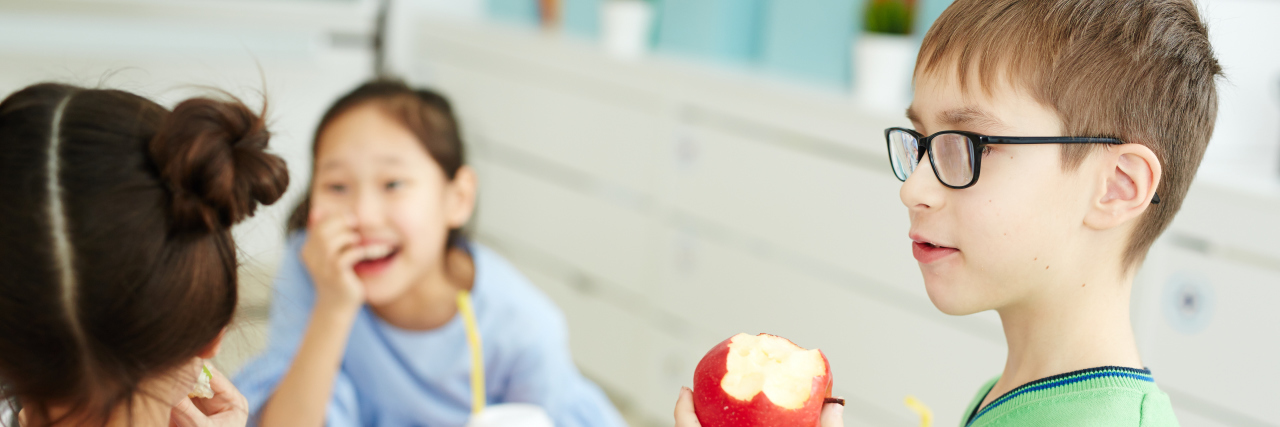When I hear other parents angrily complain about food restrictions in schools I get really frustrated. I want to educate parents about the realities of parenting a child with life-threatening food allergies (LTFA), but I’m reluctant to violate my child’s privacy. She’s been through a lot already. While most people are kind, compassionate and willing to “bend” a little to protect other people’s kids, a very vocal minority are not. Some of those people have made my child feel ashamed and embarrassed about the food allergy she hates. She certainly never asked to have it.
If you don’t know what it’s like to have a child with a life-threatening food allergy, let me give you a sense of our experience. On a good day, it means carefully reading every word on every ingredient label on all of the food your child eats (even trusted brands because manufacturing processes change without warning) and calling companies that don’t label for cross-contamination just to make sure it’s safe. It’s making sure she always has two EpiPens and her inhaler (essential items because she had a near-fatal reaction once before). She now has asthma too which dramatically increases the risk of dying during anaphylaxis. It means preparing all of her food yourself aside from the occasional trip to Chipotle or her favorite vegan place because they don’t have her allergen in their kitchens. No takeout, no fast food on the way home after a busy night at work, sports or after school activities. No Starbucks though she desperately wants to try it! It means a ton of planning before any event that involves food — and that’s almost all of them. It means sending your child out into a world full of her allergen and hoping and praying she stays safe… and that for at least a moment or two she’s allowed to enjoy an experience like everyone else. That’s a good day.
Here’s an example of a bad one: my daughter at age 6, hoarse and wheezing in the ER because her airway had swollen to the point it’s nearly closed, clawing at her eyes and face because they’ve swollen so badly, so quickly. She was admitted for two days so they could continue to work on all of that swelling by pumping her full of even more epinephrine and steroids, all while doctors were keeping a very close eye on her airway and blood pressure. It was hearing an ER doctor say that if the school nurse had given her the first Epi injection just five minutes late it likely would have been too late, and she would have died at school (that nurse will always be my hero). My child’s eyes, lips and tongue were puffy and painful for a week afterward. The collateral emotional damage and anxiety lingered much longer. All of that — because of a teacher’s careless mistake. That teacher ignored my child’s detailed food allergy action plan and safe snacks box. Instead, she fed her pudding she’d made at home with my daughter’s allergen in it. And yes, I can hear a few of you asking, “Why did your daughter take food if she didn’t know it was safe?” She was 6. She knew I had talked at length with her teacher about her food allergy, and she still believed adults would look out for her. She had to learn the hard way that’s not true.
In the wake of my daughter’s reaction, our school district re-examined its policies and procedures for protecting children with food allergies. It became clear things needed to be shored up. After a lot of research and hard work the district wrote new policies, thank God. And yes, in addition to teacher training on EpiPens and recognizing the signs of anaphylaxis, those policies limited some of the food allowed at school. It wasn’t punitive or some sort of power grab; those changes were carefully designed to protect food allergic kids (all of those children across the district, not just mine. There are more kids with LTFA than you think.). I know some of those changes were unpopular because parents called me at home to complain. Me, the mother of the kid who’d almost died. I still regret how I responded because I was too polite. I should have asked them:
If it were YOUR child who could die after eating the wrong thing, would you really think these restrictions are “stupid?” Or would you hope and pray other people would be willing to follow the rules to keep your child safe?
People need to keep food restrictions in school in perspective. Our kids are there to learn. Food isn’t the centerpiece of the experience. All children have the right to be safe and feel included at school. If your kids don’t have food allergies please extend some grace to the children who were dealt a different hand.
Photo credit: shironosov/Getty Images

